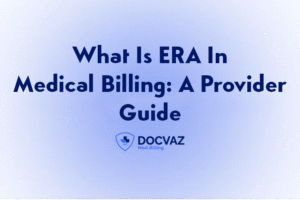Whether you’re an independent healthcare provider or a part of a larger medical organization, knowing the difference between NPI Type 1 and Type 2 is important for accurate billing and compliance. Confusion between the two can cause claim denials, payment delays, or compliance problems. This instruction from DocVaz explains the differences clearly so you can determine which NPI type – or combination – you require.
What is an NPI and why Does it Matter?
An NPI (National Provider Identifier) is a unique, 10-digit identification number assigned to healthcare providers and organizations by the Centers for Medicare and medicaid Services (CMS). It was introduced under the Health Insurance Portability and Accountability Act (HIPAA) to simplify healthcare transactions and confirm persistent identification across the payers and systems.
Before NPIs, providers used numerical identifiers such as Medicaid numbers or payer-specific IDs, which caused confusion and administrative errors. The NPI replaced these numbers, offering one permanent and universal identifier for billing, credentialing, and claim processing.
Key Facts about NPIs:
- Every NPI is ultimate and tied to one person or organization.
- NPIs do not contain coded data about providers.
- NPIs do not expire and stay valid for the provider’s lifetime.
- NPIs are required for HIPAA-covered electronic transactions, involving claim submission, eligibility checks, and claim status inquiries.
Understanding NPI Type 1 vs NPI Type 2
There are two types of NPIs – Type 1 and Type 2.
Type 1: Individuals’ NPI
Type 1 NPIs are assigned to person healthcare providers – individuals why provide healthcare facilities. This involves physicians, dentists, chiropractors, physical therapists, nurse practitioners, and others. A Type 1 NPI identifies who performed the services. It confirms that claims accurately reflect the professionals responsible for patient care. Even if a provider’s transformations include employers, sites, or specialties, the Type 1 NPI stays the same throughout their career.
Type 2: Organizational NPI
Whether Type 2 NPIs are for organizations or incorporated healthcare entities, such as medical practices, clinics, hospitals, or group practices. This NPI identifies the billing entity – the organization responsible for submitting claims and receiving the payments. When claims are submitted under the organization’s tax identification number, the type 2 NPI confirms that payments are correctly routed to the business entity, not top-person providers.
Determining which NPI you require:
The type of NPI you require is based on your practice structure. Let’s look at common scenarios to make it simple.
Solo Practitioner:
If you are a solo healthcare provider who owns your practices and bills using your personal Social Security number (SSN), you only require a Type 1 NPI. All claims and payments will be associated with you directly.
Individual Dentists Or Providers at One Practice:
If you work under a practice name or business entity with its own. TaIdentification Number, you require both:
- A Type 1 NPI for persons.
- A Type 2 NPI for practices and business.
Multiple Providers At One Practice:
When multiple providers work under a single practice or group, every provider should have their own Type 1 NPI, while the group practices should have a Type 2 NPI. Claims are tied under the group’s Type NPI and TIN, with the performing provider’s Type 1 NPI listed as the rendering provider..
Multiple Practices Or Locations:
If your company operates several practices with separate TINs, every site must have its own Type 2 NPI, while each provider retains their personal Type 1 NPI.
Why Does Having the Correct NPI Matter?
Utilizing the correct NPI type is critical for multiple reasons:
Accurate Claims Processing:
- Insurance coverage requires both individual and group identifiers to process claims correctly.
Compliance:
- HIPAA mandates the use of NPIs for electronic transactions.
Credentialing:
- Payers use NPIs to verify and credential providers and organizations.
Reduced Denials:
- Mismatched NPIs often lead to claim rejections or delayed repayments.
Always confirm that your NPIs match the payer’s records to avoid billing complications.
How to Obtain an NPI?
Getting an NPI is a straightforward procedure through the National Plan and Provider Enumeration System NPPES.
Steps to Apply:
- Visit the NPPES website.
- Create an account or log in.
- Complete the online application by providing personal and organizational details.
- Submit the applications electronically.
You will generally receive your NPI by email within some hours to five business hours a day. A paper application might take up to 20 days to proceed.
Do you Require an NPI if you only Submit Paper Claims?
If you only submit paper claims, do not engage in any electronic transactions, and an NPI is not legally needed. However, obtaining one is still highly suggested because:
- It simplifies payer communications.
- It confirms the readiness for electronic billing in the future.
- Many payers prefer or need it even for non-electronic methods.
The Role of DocVaz in Simplifying NPI and Billing:
At DocVaz Medical Billing, providers streamline their NPI registration, credentialing, and billing processes. From applying for your NPI to controlling provider updates in NPPES, our expert providers confirm complaint and smoother claim processing. Our complete medical billing services involve
- Medical coding and claims submission.
- Revenue cycle management (RCM).
- Credentialing and payer enrollment.
- Practice management software and EHR integration.
With our company you can concentrate on patient care while we handle the complications of billing and compliances.
FAQ’s:
What is NPI in medical billing?
NPI stands for National Provider Identifier - an ultimate 10-digit number for healthcare providers used in billing and claims.
How many types does it have?
These two types of NPI:
- Type 01: providers such as doctors and nurses.
- Type 02: companies like hospitals and clinics.
Can a provider have both types?
Yes, such as a doctor with a private practice might have type 1 and type 2 practices.
When to use every type in billing?
Use it in Type 1: Rendering provider and Type 2 billing or pay to providers.
Does an NPI expire?
No, it is not permanent, but it must be updated if your information changes.




